A blog of reviews for books, films, television, and music, as well as quotes and my own scrawlings. Asks, inbox, and DMs are fully open to requests, criticism, and overall ramblings. SFW. Just a dude living in New England.
Don't wanna be here? Send us removal request.
Text
To her, there was no touch as instantaneous and intuitive as the gaze. It was close to being the only way of touching without touch. Language, by comparison, is an infinitely more physical way to touch. It moves lungs and throat and tongue and lips, it vibrates the air as it wings its way to the listener. The tongue grows dry, saliva spatters, the lips crack.
—Han Kang, translated by Deborah Smith and E. Yaewon, Greek Lessons
130 notes
·
View notes
Text
From Start to Finish: Television Reviews - Adolescence

Executive Producer: Jack Thorne and Stephen Graham
Starring: Stephen Graham, Owen Cooper, Amelie Pease, Hannah Walters, Erin Doherty
Number of Episodes: 4
Years: 2025
Country: United Kingdom
***BE AWARE: SPOILERS ABOUND***
Even in our hyper fractured media landscape, there are always creative works that clear the cacophony. Although it’s early in 2025, Netflix’s limited series Adolescence has already staked the claim to be the year’s most talked about and possibly important long form presentation. A big part of this, of course, is due the series’s technical virtuosity. Using hour long single takes, series director Philip Barantini brings us uncomfortably close to this case and its players. This is not a dispassionate lens, but an active one. There is no escape. You are with the characters from start to finish. The acting, especially by Stephen Graham and newcomer Owen Cooper, is uniformly excellent. What I want to focus on in this review is the script and the themes found within them.
Episode One
This is a roller coaster of emotion. It starts with confusion, moves to incredulity, then seething frustration, and finally devastating grief. It’s established quickly Jamie (Owen Cooper) is accused of murder. He goes through the humiliating, dehumanizing processing at the police station. The police are unusually kind to Jamie, mindful of his youth, and we see the protections built into the systems at work. (One wonders if the same deference would’ve been present if the defendant was a person of color). All along Jamie proclaims his innocence. However, in the final third of the episode Jamie’s assertion changes from “I didn’t do anything” to “I didn’t do anything wrong”. This is key. It previews the revelations unearthed in the police interrogation - that Jamie killed a 13 year old classmate. It was caught on video. There is no doubt of his guilt. After the interview is over, Jamie’s father, Eddie (Graham), turns away from his son, sobbing. All that’s left is pick up the pieces.
Episode Two
I hate, hate how much I recognized the going’s on at Jamie’s school. As a high school teacher myself, every day I see the casual cruelty with which students treat each other, their nihilism, the adults who are either checked out or completely overwhelmed. Moreover, I recognize their refusal to learn. I don’t just an apathy toward learning the curriculum, but to learning actions have consequences and you need to accept those consequences. It’s no mistake when confronted, Jamie’s friend Ryan literally jumps out a window and runs. Even when he’s arrested, he refuses to understand why. What do you do with students who refuse to learn? How can you hold kids accountable when nothing is ever their fault? And then you realize something worse. Humans are imitative animals. We learn through observation. If these kids are like this, it’s a reflection of the wider world around them.
Episode Three
All reviews of this series focus in on this episode and rightfully so. It’s a tour de force of claustrophobia, building horror, and verbal sparring. Seven months after the murder, Jamie is being interviewed by psychologist Briony. She is trying to understand Jamie’s frame of mind and determine why he did what he did. Jamie vacillates wildly between insecurity, flirtation, wit, and violent anger. His explosion when he feels he cannot control the situation is unnerving, but also the window Briony needs to turn the screws. We learn Jamie has a low opinion of his own self image. We learn Katie was also the victim of bullying. This is why Jamie asked Katie out - he thought she was at her lowest, she was “weak”. Surely she’d accept even someone as “ugly” as him. Her refusal, then her mocking, triggered a deep, universally dangerous rage - the rage of a frustrated male. When asked if he is sorry for killing Katie, Jamie deflects. He refuses to accept responsibility and offers a bunch of misogynistic reasons as to why Katie was “less than”, why he’s better than her still. During his oblique confession, he even asserts he’s better than other boys because he didn’t sexually assault Katie’s corpse. Through it all, Briony stays stoic, neither condemning nor praising Jamie’s actions. (When Jamie makes particularly horrific claims, Briony replies with a measured “okay). And yet, in the end, she’s the one who throws the last punch. When Jamie demands to know if Briony likes him personally, she withholds the validation Jamie feels entitled to - just like Katie did. This difference - this time there’s a guard to there to drag away the raging, frustrated male.
Episode Four
When watching a movie or TV show/episode, a key question is “whose story is this?” For a story arc to be effective, the character needs to learn as lesson, to change. Jamie does not. He shows little remorse, little insight. Eddie, his father, on the other hand does. One of the distressing things about this story is Eddie is not a bad man. We find out in this episode he made an active effort to be a better father than the one he grew up with. But Eddie is also human and has his flaws, in this case a temper that makes his family walk on eggshells and adjusts to manage it. That’s on full display here and it’s tragic to see how Jamie’s own behavior reflects his father’s. (Humans are imitative animals). The difference is in this episode, after the fireworks die down, Eddie sits and fully confronts the consequences of his actions (or inactions) regarding the raising of his son. It’s no mistake the gutting final line of the series is not an apology to his son, but the admission and acceptance of his own culpability.
What I love about this series is how the writers Jack Thorne and Stephen Graham layer their themes. Never once do they hit you over the head with them. We’re shown via the chaos of the school in episode two a refusal to learn and to accept consequences leads to a culture of cruelty. Episode three’s verbal dance proves the Margaret Atwood adage “Men are afraid women will laugh at them. Women are afraid men will kill them.” Finally, the series ends on a mournful, yet necessary message - we only get better if we don’t hide from ourselves.
3 notes
·
View notes
Text
How many books did you read this year? I read 27 books.
Did you reread anything? What? I did not. I should.
What were your top five books of the year? If forced to choose, I would pick the following five (in alphabetical order): Lost for Words by Stephanie Butland, The Ten Thousand Doors of January by Alix E. Harrow, The Lathe of Heaven by Ursula K. Leguin, Because Internet: Understanding the New Rules of Language by Gretchen McCulloch, and A Dream in Polar Fog by Yuri Rytkheu
Did you discover any new authors that you love this year? Both Stephanie Butland and E.B. Sledge were excellent, top-notch writers.
What genre did you read the most of? My reading tastes are extremely varied, but sci-fi was the one that clocked in with the most.
Was there anything you meant to read, but never got to? Oh God, I have ten books still sitting on my desk.
What was your average Goodreads rating? Does it seem accurate? My average Goodreads rating was 3.3, which is very accurate. I'm stingy with my 4 and 5 star reviews.
Did you meet any of your reading goals? Which ones? My goal every year is to read 30 books. I failed. Womp womp.
Did you get into any new genres? Because Internet by Gretchen McCulloch was my first plunge into linguistics and I enjoyed it very much.
What was your favorite new release of the year? The sole book I read that was released this year, and happened to crack my top 10, is Annie Jacobson's Nuclear War: A Scenario.
What was your favorite book that has been out for a while, but you just now read? The Lather of Heaven by Ursula K. LeGuin. One of my top three authors, I'd somehow missed this one. Glad I finally got around to it.
Any books that disappointed you? On Grand Strategy by John Lewis Gaddis was extremely disappointing.
What were your least favorite books of the year? See above.
What books do you want to finish before the year is over? I tried finishing Hanna Pylvainen's The End of Drum-Time before the end of the year. Didn't happen, sadly.
Did you read any books that were nominated for or won awards this year (Booker, Women’s Prize, National Book Award, Pulitzer, Hugo, etc.)? I read The Lathe of Heaven (noms for Hugo and Nebula Awards), Angle of Repose (won the Pulitzer), Small Things Like These (nom for Booker), and American Prometheus (won Pulitzer).
What is the most over-hyped book you read this year? Claire Keegan’s Small Things Like These. So literary it forgot to how to engage its pathos.
Did any books surprise you with how good they were? Lost for Words by Stephanie Butland. Just really good characters in a world at once realistic and at once wish-fulfillment.
How many books did you buy? All 27.
Did you use your library? Yes, but for other purposes.
What was your most anticipated release? Did it meet your expectations? Annie Jacobson’s Nuclear War: A Scenario and, yes, it was just as thrilling, insightful, and terrifying as I’d hoped it would be.
Did you participate in or watch any booklr, booktube, or book twitter drama? Nope, nope, and nope.
What’s the longest book you read? American Prometheus: The Triumph and Tragedy of J. Robert Oppenheimer by Kai Bird
What’s the fastest time it took you to read a book? I finished Claire Keegan’s Little Things Like Thesein a couple of hours will camping.
Did you DNF anything? Why? Nope, though I did spite finish a few just to see if they’d get better. They didn’t.
What reading goals do you have for next year? Same as it ever was – read 30 books in a calendar year.
end-of-year book ask
How many books did you read this year?
Did you reread anything? What?
What were your top five books of the year?
Did you discover any new authors that you love this year?
What genre did you read the most of?
Was there anything you meant to read, but never got to?
What was your average Goodreads rating? Does it seem accurate?
Did you meet any of your reading goals? Which ones?
Did you get into any new genres?
What was your favorite new release of the year?
What was your favorite book that has been out for a while, but you just now read?
Any books that disappointed you?
What were your least favorite books of the year?
What books do you want to finish before the year is over?
Did you read any books that were nominated for or won awards this year (Booker, Women’s Prize, National Book Award, Pulitzer, Hugo, etc.)? What did you think of them?
What is the most over-hyped book you read this year?
Did any books surprise you with how good they were?
How many books did you buy?
Did you use your library?
What was your most anticipated release? Did it meet your expectations?
Did you participate in or watch any booklr, booktube, or book twitter drama?
What’s the longest book you read?
What’s the fastest time it took you to read a book?
Did you DNF anything? Why?
What reading goals do you have for next year?
17K notes
·
View notes
Text
I heard the bells on Christmas Day,
Their old familiar caroling.
Wild and sweet, the words repeat:
“Peace on earth, good will to Man.”
Merry Christmas! 🎄
0 notes
Photo

Anaïs Nin, from Incest: From a Journal of Love
15K notes
·
View notes
Text
25 of 250 Favorite Fiction - The Iliad
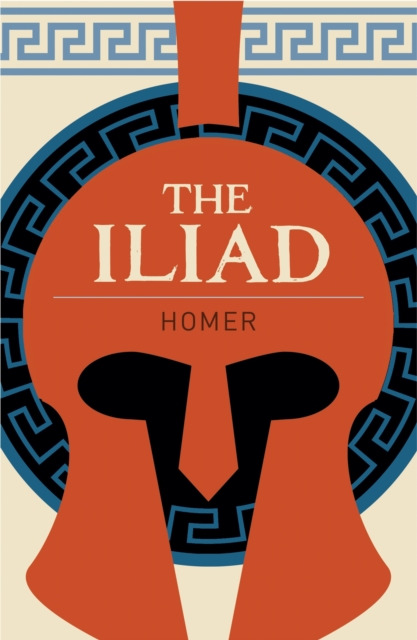
Author: Homer
Date of Publication: 8th century B.C.
Country: Greece
“The true hero, the true subject, the centre of the Iliad, is force. Force employed by man, force that enslaves man, force before which man's flesh shrinks away. In this work, at all times, the human spirit is shown as modified by its relations with force, as swept away, blinded, by the very force it imagined it could handle, as deformed by the weight of the force it submits to.” - Simone Weil, “The Iliad, or The Poem of Force”
The summer before college, I was required to read The Iliad, Homer’s mournful, millenia old poem about the legendary Trojan War. While reading and annotating, I kept writing in the margin “why are they surrendering their free will?” What I was too young to understand, and what Weil summarizes perfectly in the first three sentences of her seminal critique, was that they hadn’t. They had no free will to begin with.
Homer would have you believe the gods determined these mens’ actions and their fate. For those who don’t believe, who look at the poem through a modern lens, the poem shows the constraints people operate under. Agamemnon, trying to keep a coalition together, uses force to assert his dominance. Men surrender to the force of the gods before duels. And most memorably, Achilles calls upon all his force to avenge his beloved Patrocolus. All of these choices are dictated by the ebbs and flows of force as it transfers from one character to another, leaving no character untouched - or undamaged.
0 notes
Text
There are so many ways the dead show us they are with us. Sometimes they stay deliberately absent, in order to prove themselves by returning. Sometimes they stay close and then leave in order to prove they were with us. Sometimes they bring a stag to a graveyard, a cardinal to a fence, a song on the wireless as soon as you turn it on. Sometimes they bring a snowfall.
Anne Michaels, "Held"
24 notes
·
View notes
Text
25 of 250 Favorite Fiction - Tinkers
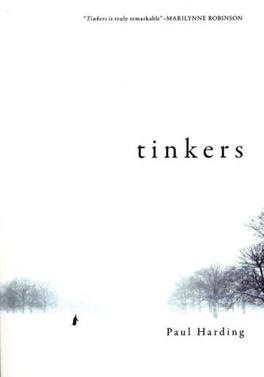
Author: Paul Harding
Date of Publication: 2009
Country: United States
What is a “New England” story? More than just a place, the name New England brings forth a certain mindset, imagery, and tone that’s hard to delineate but easy to identify when it’s on the page. If I were to hazard a definition, a New England story requires a recognition of the region’s comparative age to the rest of the nation and a sense of communalism due to that age.
Perhaps that’s why I took to Paul Harding’s Pulitzer Prize winning debut Tinkers. Set mainly in New England’s rural backwoods, it tells the story of George, a fixer of broken clocks who lays on his deathbed, mind wandering through the past. Harding also relates the story of George’s father, Howard, a tinkerer of a different sort. Howard marks a living selling goods to the country families eking out a hardscrabble existence in the unforgiving North Woods. However, George has a secret that threatens to undermine his family’s stability and, ultimately, causes the break-up of the family.
Make no bones about it, Harding is a poetic writer whose gifts for imagery and compassion make for a formidable combination. You empathize with Howard’s struggle and fear, as well as George’s obsession with clocks, time, and the beauty found within both. It’s no mistake that the father and son mirror each other and, to Harding’s credit, he doesn’t belabor his theme. There’s beauty in nature, in solitude, in the passing of time - all of which native born New Englanders feel in their bones.
0 notes
Text

Mary Oliver, ‘north country’
70K notes
·
View notes
Text
25 of 250 Favorite Fiction - My Brilliant Friend
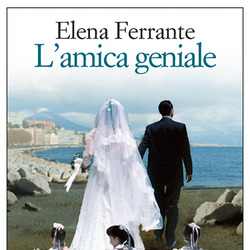
Author: Elena Ferrante
Date of Publication: 2011
Country: Italy
Childhood friendships can disguise so many things. Having no other frame of reference, children don’t see the poverty they live in, or the smallness of the confines of the neighborhood. All of this is captured beautifully in Elena Ferrante’s My Brilliant Friend, the first novel in a quartet that chronicles the lives of Elena (i.e Lenu) and Raffaella (i.e. Lila) from their childhood through their old age. All four novels are worth their salt, but My Brilliant Friend is a step above due to how well Ferrante portrays childhood.
Ferrante (who writes in terse, tight prose that never loses its humanity) starts her story with two six year old girls. It’s quickly established that the novel’s protagonist, Lenu, struggles with doubt. Smart and studious, she negatively compares herself to Lila. It’s easy to see why. Not only is Lila smart, she is defiant and determined to make her stamp on the world. This first appears when teaches herself to read and write without the aid of school and writes a story that Lenu thinks is brilliant. However, due to a variety of familial reasons, Lila’s brilliance can’t be translated to school and their teacher, Olivero, advises Lenu to leave her friend behind.
Over the next three novels, that push and pull of Lila on Lenu’s life will be the core conflict of the novel. However, none of it would work without this stellar introduction that recalls the foundational mini-opera of childhood as it expands to the wider world.
1 note
·
View note
Text
Aging has changed me. Relationships have changed me. Hormones have changed me. Trauma has changed me. A body is a mobile home. A body is a slow time machine.
Hazel Jane Plante, Any Other City
936 notes
·
View notes
Text
My Quirky Taste in Music: MTV Unplugged - Liam Gallagher
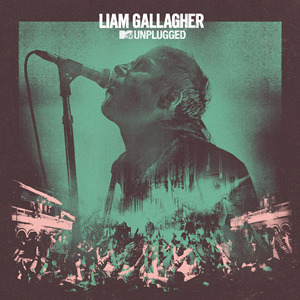
Year Released: 2020
Country: United Kingdom
All reviews of Liam Gallagher’s MTV Unplugged session invariably mention the infamous MTV Unplugged concert by Oasis in 1996, when both the long running program and Oasis were at the height of their cultural and creative powers. Gallagher missed that concert, going on a week long bender, only to show up in the balcony drunk during the taping to heckle his brother Noel, who was filling in for Liam’s singing duties. There’s a sense of righting a historical wrong in Liam making this album. As with all things Gallagher, many of this concert’s features are designed to contrast with Liam’s older brother - the man who wrote the defining, anthemic songs Liam brought life to with his voice. The choice of city, Hull, is deliberate (Noel famously disparaged the city), as is singing songs that Noel sang for Oasis.
All that said, judged on its own merits, the album highlights Liam’s strengths and weaknesses. The obvious weaknesses are the songs from Liam’s solo career, none of which jump out at the listener. It’s the Oasis songs that catch the listener’s ear. Part of that is thanks to the mix, which highlights the audience singing every word of the Oasis songs. You can feel the unusually strong connection between Liam and his audience, feel them carrying notes that Liam (whose voice is better than it’s been in years) cannot elongate anymore with his trademark sneer inflection. Hearing the audience pick up Noel’s missing backing vocals at the end of “Some Might Say” sends a chill up one’s spine.
The best song on the album is the one Liam steals from his brother Noel. “Sad Song” was a b-side, the first one to be sung solely by Noel and its lyrics feature many of his trademark romantic melancholy. Liam sings it his way. His phrasing - always assertive, always gritty - invokes the song’s outrage with breathtaking forthrightness. It’s an absolute stunner. You can feel the conversation happening between brothers, the omnipresent strain between them, and the magic that made Oasis the anthemic voice of a generation of Britons.
4 notes
·
View notes
Text

Ritual Is Journey, Chris Abani
21K notes
·
View notes
Text
25 of 250 Favorite Fiction - I Heard the Owl Call My Name
Author: Margaret Craven
Date of Publication: 1967
Country: Canada
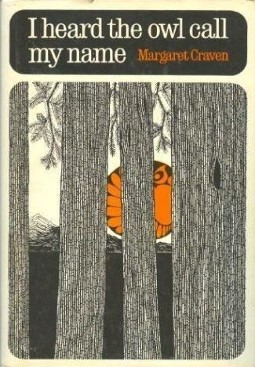
Among the Dzawa̱da̱'enux̱w, a First Nations tribe in British Columbia, there’s the belief that when an owl calls your name it foretells your own death. This is fitting for Mark, a priest dying of an unnamed disease in Margaret Craven’s tender, empathetic novel. He’s been sent to a village in coastal British Columbia teetering on death from young people leaving and the ravages of time itself.
The novel’s effectiveness comes from Craven’s tone. While she presents some white characters in an unsympathetic light, her characterization of Mark as someone open to learning and the ways of the village show the magic that can happen when people do that. She writes, “To join the others was to care, and to care was to live and to suffer.” Our perception of Mark is shaded by information we glean from the novel’s opening chapter where we learn that Mark doesn’t know about his disease (his bishop keeps him uninformed). It’s a stretch, plotwise, but it fits Craven’s themes.
Mark’s own impending mortality mirrors what’s happening to this small, isolated fishing village. Many of the young people are leaving for Vancouver (and one incident in the novel has Mark traveling there to find and rescue someone in trouble), leaving the future of the village in doubt. In this respect, Craven leaves her reader optimistic. By the time Mark hears an owl call his name, we have confidence that this little village on the edge of a continent can survive even if individuals do not.
0 notes
Text
“Everything you say should be true, but not everything true should be said.”
— Voltaire
1K notes
·
View notes
Text
25 of 250 Favorite Fiction - And Then There Were None
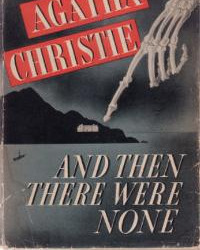
Author: Agatha Christie
Date of Publication: 1939
Country: United Kingdom
Ten strangers arrive on an island. They dine and bristle at each other’s company, unsure of why they are here. A record played after dinner accuses all ten of them of being responsible for someone’s death. All but one denies the charges. Another sips a drink and promptly falls dead. After some investigation and deliberation, the elderly Judge Wargrave pronounces: “One of us in this very room is in fact the murderer.” Thus begins one of the best selling novels of all time.
Agatha Christie is at times considered light reading, her stories pigeon holded as elaborate, cozy mouse traps that are (despite their subject) bloodless. Christie did write her fair share of mundane puzzles devoid of characterization and thematic heft; however, her best work hides an ocean of darkness in which characters often drown and the ending, while providing justice, does not offer sunshine.
And Then There Were None is definitively the latter. There are no heroes in this story, no good people. While the poem at the heart of mystery is an elegant and devious guide and the key to Christie’s genius plotting, it also “others” the characters. By the nature of their crimes, they have violated society’s rules and thus stand apart - symbolized by the ten figurines on the dining room table. As those figurines disappear with each death, the novel builds to a frightening and twisted crescendo in which the karmic debt these “others” have incurred is repaid in ways that have thrilled for 85 years.
0 notes
Text
“The hall is rented, the orchestra engaged, now it’s time to see if you can dance…”
— Q to Picard
5 notes
·
View notes